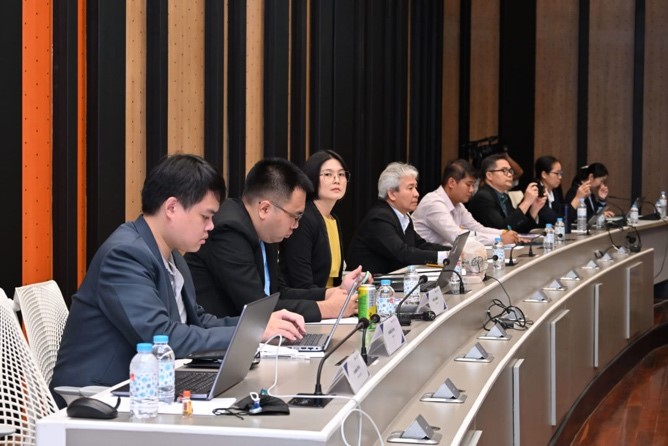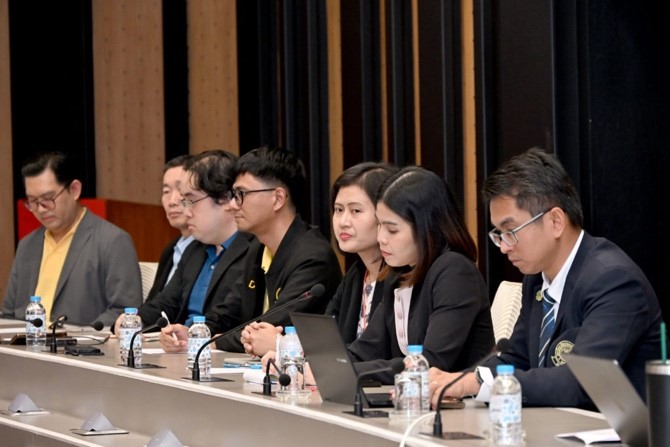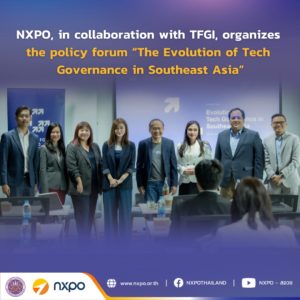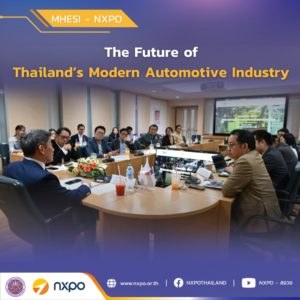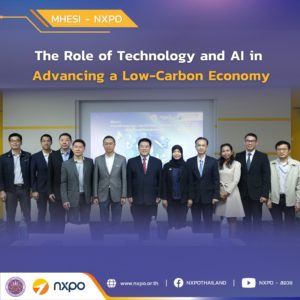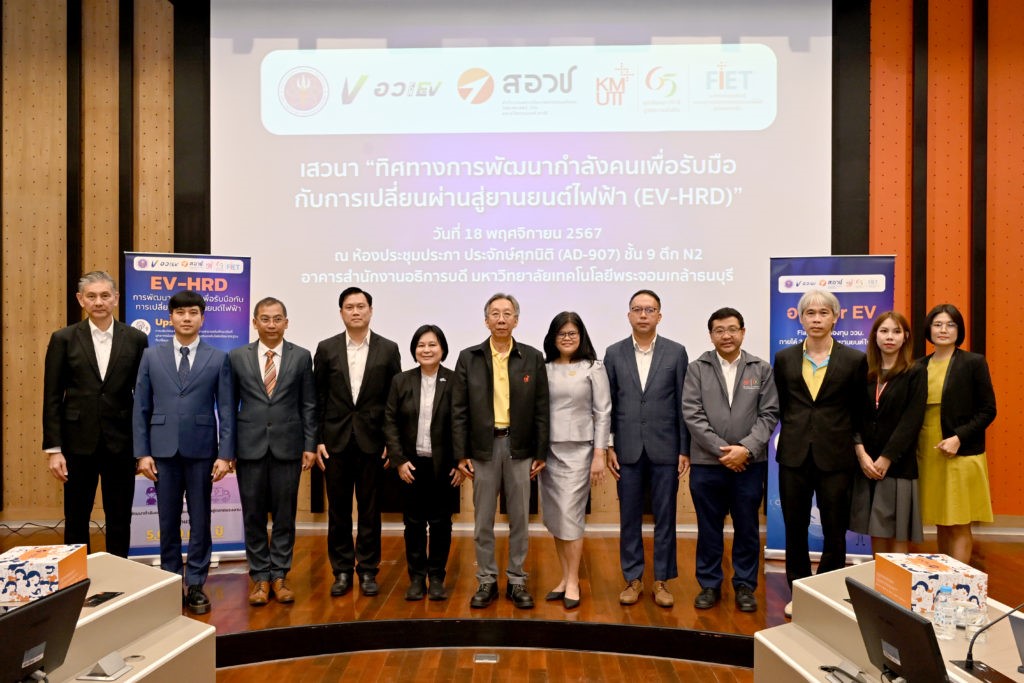
On 18 November 2024, MHESI-NXPO, in collaboration with the Faculty of Industrial Education and Technology (FIET) at King Mongkut’s University of Technology Thonburi (KMUTT), hosted a seminar on strategic directions for workforce development to support the electric vehicles transition (EV-HRD). Held at KMUTT, the event was inaugurated by Assoc. Prof. Dr. Suvit Saetia, President of KMUTT, and featured presentations by Dr. Thanakarn Wongdeethai, NXPO Strategist, on the role of government and a call for proposals for this initiative.
The seminar brought together over 80 participants from 22 organizations across government, academia, and industry. Key participating organizations included the Program Management Unit for Human Resources & Institutional Development, Research and Innovation (PMUB), National Science and Technology Development Agency (NSTDA), Board of Investment (BOI), Department of Skill Development, Thailand Development Research Institute (TDRI), KMUTT, Kasetsart University, King Mongkut’s Institute of Technology Ladkrabang (KMITL), Burapha University, Electric Vehicle Association of Thailand (EVAT), Electric Vehicle Conversion Association of Thailand (ECAT), 24M Technologies (Thailand) Company Limited, and ECU Shop 1 Company Limited.
The seminar comprised three sessions.
Session 1: The Role of Government in Developing the EV Workforce
Dr. Suvit emphasized the urgent need for workforce development in a technology-driven era, particularly in emerging fields like electric vehicles (EVs). He highlighted the importance of advancing EV-related education through upskilling, reskilling, and new skill development, underscoring the necessity of collaboration across sectors. Faculty development through learning support is essential to enhance curriculum design and research on EVs. He further stressed the importance of fostering a robust teaching and learning ecosystem, bolstered by private sector partnerships for laboratory and research initiatives.
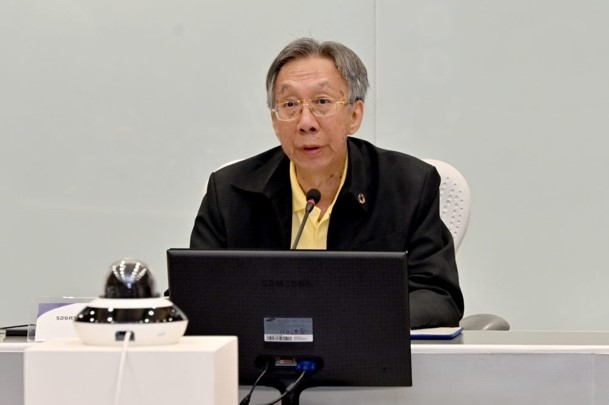
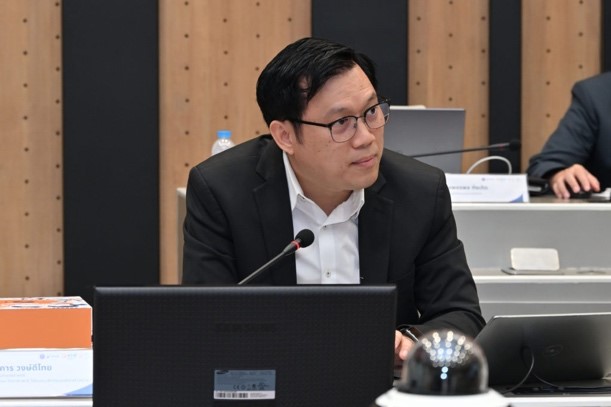
Dr. Thanakarn underscored Thailand’s longstanding strength in the automotive industry, which spans over 60 years, noting the new skills required to support the EV transition to ensure that Thailand is able to reach the target of “30@30” policy. These skills include hardware and software design, charging infrastructure development, and second-life battery management. The Ministry of Higher Education, Science, Research, and Innovation (MHESI) has introduced policies in three areas: 1) EV Workforce Development (EV-HRD), 2) EV Industry Transformation (EV-Transformation), and 3) EV Innovation (EV-Innovation). These initiatives have led to the launch of EV programs developed under the university-industry collaboration in 51 vocational schools nationwide and the establishment of training center to foster collaboration with industry and international partners. Other initiatives include employee-development tax incentive provided by the Thailand Plus Package and the STEMPlus platform connecting learners with industries. This year, MHESI unveiled a workforce development plan aimed to support key industries. For the EV industry, the plan expects to produce 150,000 skilled workers over the next 5 years, with an annual upskilling goal of 5,000 professionals.
Ms. Sudhasinee Smitra from BOI outlined BOI’s role in advancing Thailand’s EV industry, including tax incentives for training centers and investments in projects such as battery recycling technologies. Collaborating with the Ministries of Industry, Energy, and Finance, BOI has implemented measures to boost EV demand and investment, such as subsidies and excise tax reductions. BOI also supports investors in advanced technology training, providing mechanisms to strengthen workforce capabilities.
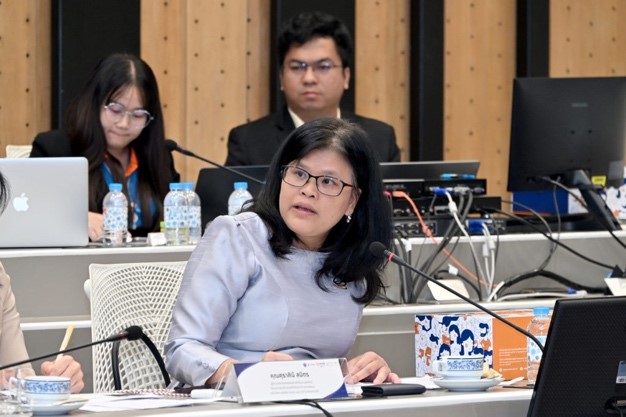
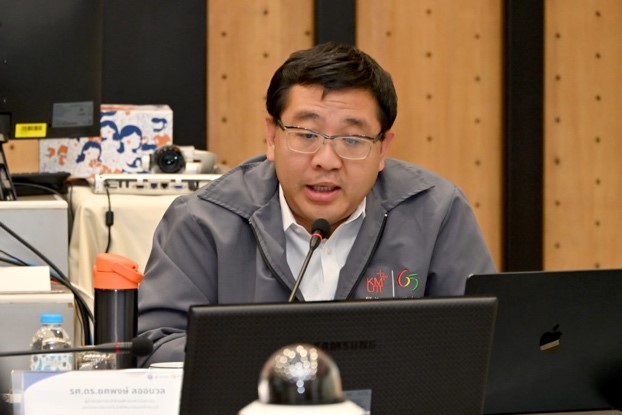
Assoc. Prof. Dr. Yossapong Laoonual, Assistant to the President for Sustainability Development and Head of the Mobility & Vehicle Technology Research Center (MOVE) at KMUTT, highlighted MOVE’s pivotal role in facilitating the transition to Connected, Autonomous, Shared, and Electric Vehicles (CASE). MOVE focuses on sustainable transportation technologies, collaboration with industries, building domestic and international research networks, upgrading laboratories to international standards, integrating research into education, and supporting net zero emissions goals.
Assoc. Prof. Dr. Sathaporn Chuepeng, Vice President for Sriracha Campus and Acting Dean of the Faculty of Engineering at Kasetsart University, emphasized the university’s role in developing EV-related skills through academia-industry partnerships. Collaborations have led to short courses, degree programs, and certification programs tailored to labor market demands. The university also plans to establish a center of excellence for research and innovation in hydrogen energy, fuel cells, and autonomous vehicles.
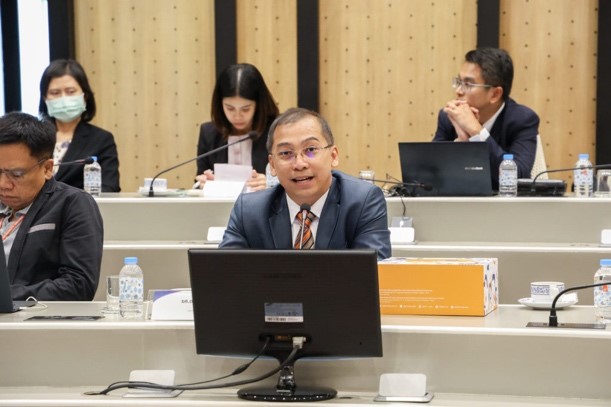
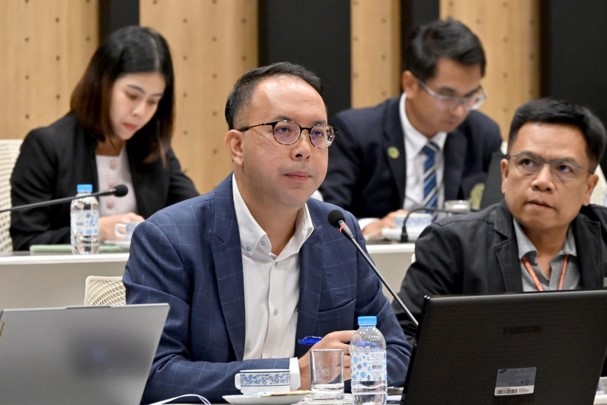
Mr. Teerasak Yuphech, Director of the Automotive Human Resource Development Academy (AHRDA) under the Department of Skill Development, highlighted the department’s efforts to address workforce shortages in areas like charging station installation and vehicle maintenance. The department has designed a comprehensive workforce development plan for workers, students, and recent graduates, focusing on advanced skills such as PLC systems, automation, and IoT technologies, developed in collaboration with industry experts.
Session 2: Workforce Demand in EVs and Related Industries Mr. Suroj Sangsnit, President of EVAT, highlighted Thailand’s successes and opportunities in the EV industry. He emphasized the importance of foreign investments in setting up manufacturing plants in Thailand that cater to both domestic and export markets, including ASEAN and Europe. With 78% of the ASEAN EV market share, Thailand demonstrates significant market potential. However, sustaining this growth requires a skilled workforce, a robust domestic supply chain, and effective technology transfer from abroad. He suggested establishing ASEAN-branded EV manufacturing as a long-term goal, emphasizing the use of locally produced components and raw materials. He also identified battery recycling as a key business opportunity to enhance the industry’s economic value and sustainability.
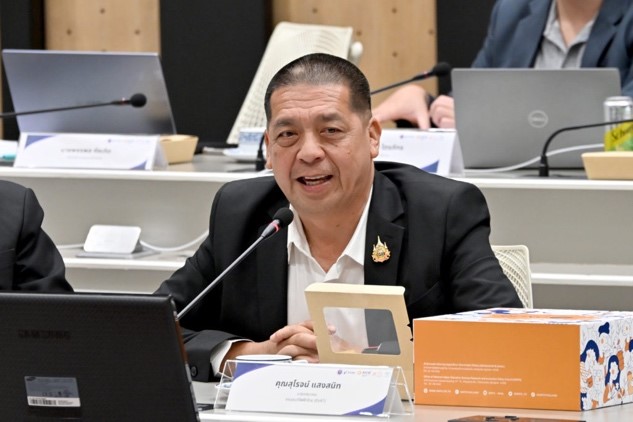
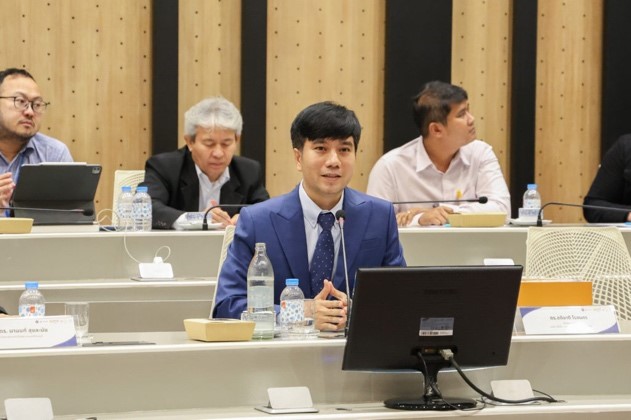
Dr. Atichat Rotjanakorn, representing 24M Technologies (Thailand), explained that the company is a subsidiary of a global leader in EV battery technology. Operating a research center and pilot plant in Thailand, the company aims to position the country as ASEAN’s battery development hub. Their focus is on creating high-performance, safe, affordable, and eco-friendly batteries. To meet workforce needs, they recruit Ph.D. researchers and engineers specializing in mechatronics and materials science to support autonomous manufacturing. The company also offers competitive compensation, career growth opportunities, and skill development to attract and retain top talent.
Mr. Pollapot Wanpinyocheep, Managing Director of ECU Shop 1, discussed trends in automotive parts, particularly controllers and software essential for EV conversion trucks and advanced safety systems. A major challenge for Thailand is achieving international market recognition. In workforce development, the company prioritizes candidates with programming expertise and design skills, particularly in human-machine interface (HMI), user experience (UX), and user interface (UI). High turnover rate and the growing complexity of tasks requiring additional training remain key challenges. Specialized skills in the Controller Area Network (CAN) protocol are crucial for advancing Thailand’s EV industry.
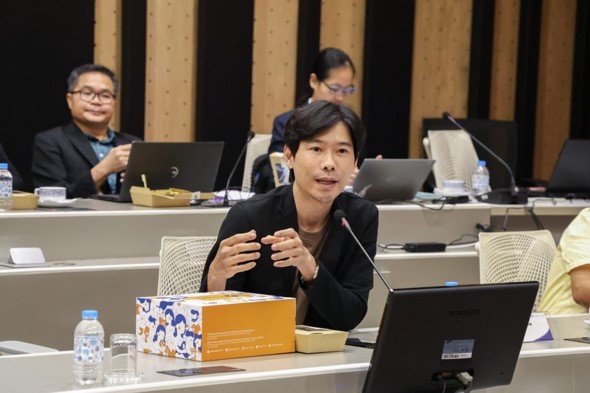
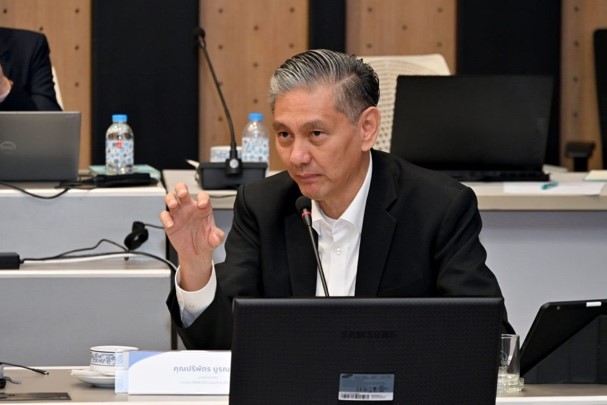
Mr. Pariphat Buranasin, President of ECAT, highlighted EV conversion as a critical step in transitioning from internal combustion engine vehicles to EVs. He noted how the automotive industry’s rapid evolution impacts related businesses, including spare parts, used cars, and insurance. Batteries, which account for up to 40% of an EV’s cost, were identified as critical components. Beyond EVs, batteries play a vital role in industries such as energy storage, medical devices, military equipment, data centers, robotics, marine transportation, and electric motorcycles. Each application requires specific industry knowledge and workforce development. He emphasized the need to cultivate skilled talent to address these diverse demands, ensuring Thailand’s competitiveness and the sustainability of its EV sector.
Session 3: Call for Proposals for EV-HRD Dr. Pavadee Aungkavattana, Deputy Director of PMU-B, outlined MHESI’s efforts and PMU-B’s role in this initiative. She detailed PMU-B’s mandate to manage national funding for research and workforce development, particularly in advanced technologies like quantum technology and high-energy physics, which are crucial for advancing energy and EV technologies. The unit also focuses on fostering ecosystems and infrastructure to support economic and social growth while equipping citizens with skills to adapt to rapid technological changes. PMU-B’s five-year strategic plan emphasizes workforce development in target industries, including EVs, semiconductors, and frontier technologies, aligning with national strategies and key MHESI policies like “MHESI for EV” and “MHESI for Semiconductors.”
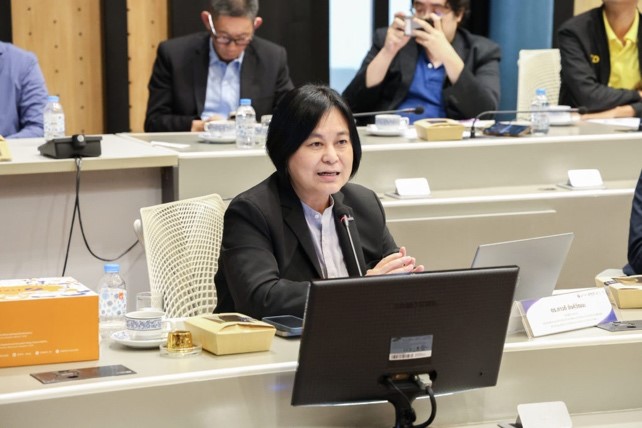
Dr. Thanakarn elaborated on MHESI’s EV workforce development goals, which aim to train 150,000 workers over five years. This includes upskilling 30,000 existing workers from the internal combustion engine sector and preparing 5,000 new graduates annually. As the lead agency for the EV-HRD initiative, NXPO is developing a workforce development proposal in collaboration with partner institutions for submission to PMU-B. The proposal includes components such as curriculum development, tax incentives, and a platform for skill development and certification.
This seminar underscored the pivotal role of workforce development in driving Thailand’s EV industry forward and served as a starting point for translating insights into actionable plans.
